#death valley national park
Explore tagged Tumblr posts
Text
BEAUTIFUL SHOT.

Hung Ton
Death Valley National Park, California.
#DEATH VALLEY NATIONAL PARK#HUNG TON#CALIFORNIA#RUSHING CLOUDS#DESERT#NATURE PHOTOGRAPHY#mutant-distraction
35 notes
·
View notes
Text

The Milky Way rising above the mountains in Badwater Basin, Death Valley National Park
#death valley national park#death valley#milky way#galaxy#aimeekb#stars#night sky#astrophotography#badwater basin#hiking#adventure#explore#travel#nature#lesbians who hike#mountains#california#milkywayphotography#nebula#dark sky#dark sky park#california desert#desert
5K notes
·
View notes
Text










Emigrant Canyon Road to Hummingbird Spring and Wildrose Charcoal Kilns - Death Valley National Park (2022)
#death valley#joshua tree#desert#california#california desert#mojave desert#american southwest#desert southwest#death valley national park
2K notes
·
View notes
Text


See that white layer in this hillside? That's an extremely important white layer. 680,000 years ago (give or take), a large volcanic system in what is now Wyoming erupted catastrophically, spewing ash and debris across the North American continent. You might have heard of it, it's called Yellowstone Caldera. You may notice that these pictures in no way resemble the verdant forests of the Rocky Mountains and that is because they are from Death Valley, California, located more than 620 miles (1000 km) away from the Yellowstone Caldera!

But... it gets cooler.
The hills this ash layer is exposed in, the Kit Fox Hills, have been uplifted. The mudstone and sediments here are ancient valley fill, meaning that they used to be the bottom of the valley and are now about 400'/120 m above the current valley floor. This is the action of the Northern Death Valley fault zone, one of California's longest active faults. In this area, that fault has some excellent outcrops as seen below.



Next door to Death Valley to the west is Panamint Valley. It's not quite as big or dramatic as Death Valley but it has many of the same sorts of geologic features which have formed over a shorter geologic timeframe, interestingly. The faults in Panamint Valley just move faster than those in Death Valley so things are a little more youthful over there. In the middle of Panamint Valley, we see this same Yellowstone ash layer but with a caveat - instead of a mere 400 feet, in Panamint Valley that ash is more than 500 feet above the valley floor! That suggests that the valley subsidence of Panamint Valley is about 20% faster than Death Valley. The true story is more complex than that, but it's good as a reference point. Let's see what that looks like.

It's hard to see in this aerial imagery, but near the top of this steep escarpment is that same volcanic ash layer. It's a bit thicker here because this big pile of material I've outlined is an ancient delta. Panamint and Death Valleys have repeatedly hosted large lakes during cooler and wetter times. This huge delta deposit is over 1.2 million years old at the base, and about 600,000 years old at the top (above the Yellowstone ash). As the Panamint Mountains (background) rose and the valley subsided, huge amounts of eroded rock and gravel were dumped on this delta. So what you're looking at is a 1 million year-long record of the floor of Panamint Valley! How cool is that?
#geology#adventures#bettergeology#rocks#delta#death valley#california desert#eastern california#california#southern california#mojave desert#death valley national park#death valley geology#geology is cool
733 notes
·
View notes
Text

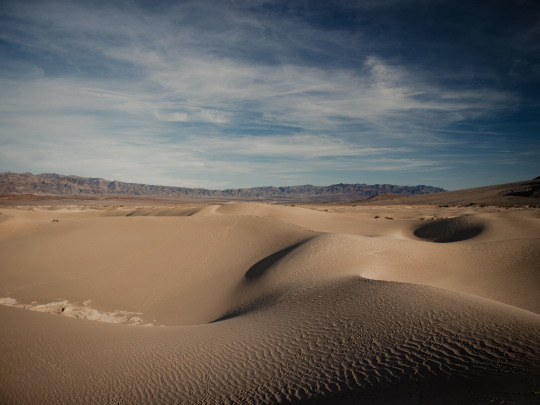
a sea of sand
#landscapes#landscape photography#photography#photographers on tumblr#original photography#mine: photos#desertcore#desert#nature photography#naturecore#death valley#death valley national park#mojave desert#national parks#find your park#mesquite flat sand dunes#sand dunes
503 notes
·
View notes
Text

Excerpt from this story from the Las Vegas Sun:
A population spurt for the Devils Hole pupfish, a critically endangered fish at Death Valley National Park, is giving scientists cause for optimism, the National Park Service said.
Scientists from the park service, the Nevada Department of Wildlife and the U.S. Fish and Wildlife Service counted 191 pupfish at Devils Hole over the course of their spring study April 5 and 6, officials said. That marks a 25-year high, they said.
“Increasing numbers allow the managing agencies to consider research that may not have been possible in the past, when even slight perturbations of habitat or fish had to be completely avoided,” said Michael Schwemm, senior fish biologist for the U.S. Fish and Wildlife Service. “We’re excited about the future directions with respect to managing this species.”
Many pairs of the fish were found courting and spawning in their 92-degree habitat, officials said.
The species fully resides in Devils Hole, a water-filled cavern near Ash Meadows National Wildlife Refuge in Nye County. Officials say Devils Hole is the smallest habitat of any vertebrate species on the planet.
The fish are found in the upper 80 feet of the cave and depend on an 11-by-16-foot sunlit shallow shelf at the cavern’s entrance for food and spawning, officials said.
Historically, the pupfish’s population ranges between 100 to 200 in winter and 300 to 500 in late summer — an all-time low of 35 fish was recorded in 2013.
The tiny fish, averaging less than 1 inch in length, lived in relative isolation for between 10,000 and 20,000 years after periods of flooding and dryness created the cavern they call home, the park service said.
Flooding last summer from Hurricane Hilary was a benefit to the fish’s ecosystem, officials said, because it added nutrients that washed off the surrounding land surface in a fine layer of clay and silt.
2K notes
·
View notes
Text

Photography by Xuebing Du
Instagram: xuebing.du
#photographers on tumblr#original photographers#nature#mosquito sand dunes#sand dunes#sunset#death valley national park#yellow
658 notes
·
View notes
Text




Salt Creek, a seasonal creek and home to the very rare Death Valley pupfish.
Death Valley National Park, California
Spring 2019
#Death Valley National Park#california#pupfish#death valley pupfish#fish#fishblr#travel#original photography#photographers on tumblr#photography#lensblr#wandering#creek#national park service#national park#nature#nature photography#landscape#landscape photography#desert#desert photography#wildlife#wildlife photography#animals#animal photography#wanderingjana
164 notes
·
View notes
Text
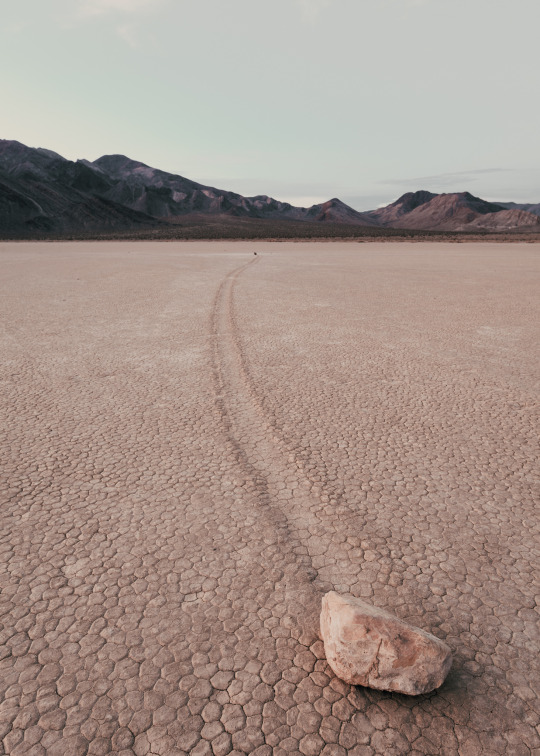
Death Valley -- Casey McCallister \\ Instagram
#death valley#death valley national park#landscape photography#sailing stones#fine art photography#earth tones#California desert#desert southwest#national park
344 notes
·
View notes
Text
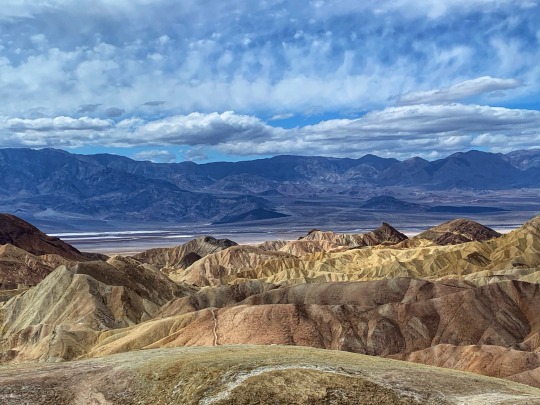
Death Valley from Zabriske Point, Inyo County, 2020
#landscape#mountains#desert#death valley national park#inyo county#california#2020#photographers on tumblr
323 notes
·
View notes
Text
Fish of the Day
The fish of the day today is the devils hole pupfish!
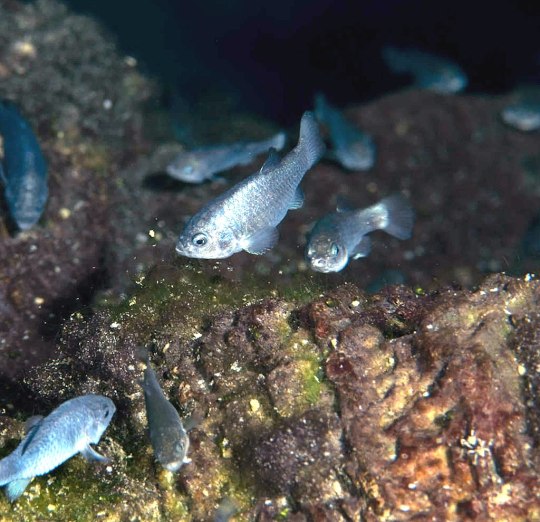
The devils hole pupfish, scientific name Cyprinodon diabolis, is an endangered fish known to live in exactly one spot, Devils hole. Devils hole is a limestone cavern with a geothermal pool found in Nye county of Nevada, and a disconnected section of Death Valley National Park. The geothermal pool keeps the water at a consistent 33 degrees Celsius all seasons, and has low dissolved oxygen amounts. The surface of water at the cave is only 72ft by 12ft, but below that the cave descends deep into the earth. Below the surface pool there is a larger cavern descending to 150 meters at its deepest before branching into a smaller tube at the bottom, the depth of which is currently unknown.1965 two teenagers went diving in the hole with scuba gear, and were never seen again, rescue divers sent after them found a dropped flashlight, and other scuba gear but the bodies were never found. One rescue diver dropped a weighted plate that fell a full 932ft without contacting a bottom to the chamber, describing the water below him as an "infinity chamber". Later scans of the cave revealed it is at least as deep as 1,247ft, although to this day the depth is still unknown. Another well known aspect of the cave is that it can be used to determine when there are earthquakes all over the world. The water surges and has displayed unique patterns during the 2022 Mexico 7.6 magnitude earthquake, along with other strong earthquakes further from the hole. Such as: the 2012 6.2 magnitude earthquake in Papua New Guinea, or the 2018 7.4 magnitude earthquake in Indonesia. Devils hole pupfish are known to live only in the first 80ft of the cave.
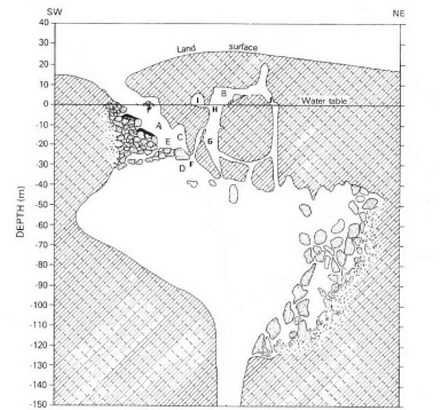
Devils hole pupfish are unique in appearance, getting only as large as an inch, and being one of few species that have no pelvic fins, however when raised in colder conditions these pupfish will regrow these appendages. As juveniles these fish are an off white color, and females retain some of this coloring in adulthood. This species has only ever been recorded with as many as 500 wild fish at its highest, hitting an all time low point of 42 fish in 2007. The more recent numbers are looking up however, and there were 263 pupfish observed in spring of 2022. The survival from egg to adulthood is small, but the likelihood with human effort that this fish will survive the test of time is high. Described as possibly the most isolated wild vertebrate species in the world. These fish live only 10-14 months, reaching sexual maturity at 8-10 weeks old and spawn year round with peaks in mid February-May, and a smaller peak in July-September. Due to the unique oxygen levels of devils hole, these fish have adapted to enter a state of tupor, similar to hibernation, where they can live anaerobically. This allows them to go without breathing for up to 2 hours, however they produce ethanol as a byproduct.
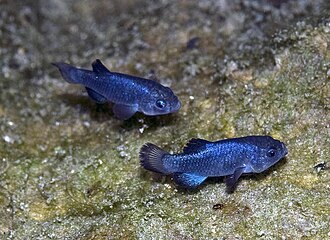
Most of the devils hole pupfish life is on the rocky outcrops of the surface waters of the cave system. Breeding, egg laying, diet, resting, and schedules surrounding the placement of the sun all depend on these rocky outcroppings of stone near the surface of the water. The diet of these fish is dependent on the rock outcroppings of the cave, as they eat anything they can find in the cave system. This includes: small freshwater crustaceans, beetles, flatworms, freshwater snails, inorganic matter made of small sections of the caves limestone, along with spirogyra and diatom algae, which grows on the rocks themselves and makes up most of the pupfish's diet. Due to their diet being mostly algae types, pupfish are incredibly susceptible to the seismic activity in the devils' hole, as it creates small tsunamis along surface water and washes away algae on the rocks, leaving them without a majority of their food source until it regrows. When these earthquakes happen the pupfish are known to flee into the deer waters of the cave until the water has stilled, and are thought to perhaps feel earthquakes before they happen, although not much research has been done on this yet.
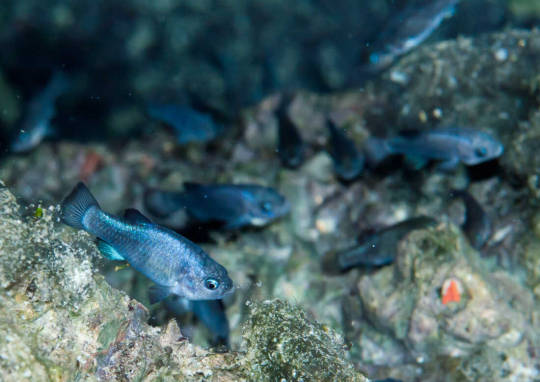
Have a good Wednesday, everyone!
#pupfish#fish#fishblr#devils hole#devils hole pupfish#nevada#Cyprinodon diabolis#death valley#death valley national park#ash medows#ash medows fish conservation
217 notes
·
View notes
Text

From Zabriskie Point.
Death Valley, 2018.
#photographers on tumblr#original photographers#street photography#black and white#travel#film photography#analog#analogue#b&w#street#nature photography#bnw nature#landscape#desert#death valley#death valley national park#zabriskie point#35mm film
314 notes
·
View notes
Text

The galactic center of the Milky Way rising above Zabriskie Point, Death Valley National Park
#milky way#galaxy#death valley national park#death valley#aimeekb#stars#nightsky#zabriskie point#lesbians who hike#hiking#nature#adventure#explore#travel#mountains#california#california desert#nebula#space#look up
836 notes
·
View notes
Text
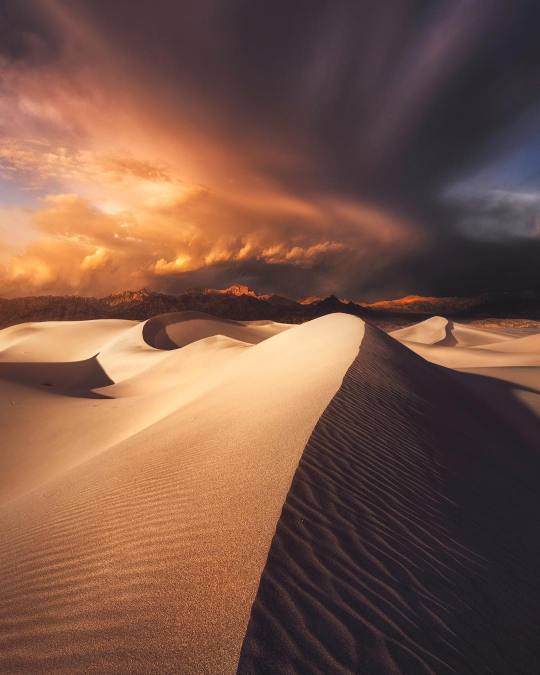
Death Valley National Park 🌍
#death valley national park#usa#sand dunes#beautiful nature#travel photography#amazing nature#travel#nature#travel destinations#landscape#landscape photography
100 notes
·
View notes
Text
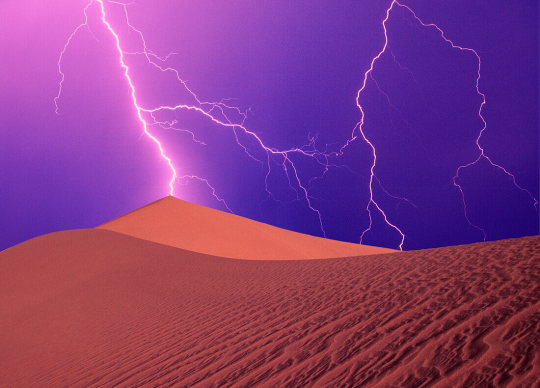
Death Valley National Park
#Death Valley National Park#sand#red sand#sand dunes#lightning#storms#purple#glow#sky#weather#landscape#landscapes#aesthetic#nature photography#curators on tumblr
914 notes
·
View notes
Text


badwater basin
#when you leave your tripod in the car but gotta try the pano anyway#landscapes#landscape photography#photography#photographers on tumblr#original photography#mine: photos#desertcore#desert#nature photography#naturecore#death valley#death valley national park#mojave desert#national parks#badwater basin#badwater#sunset
859 notes
·
View notes